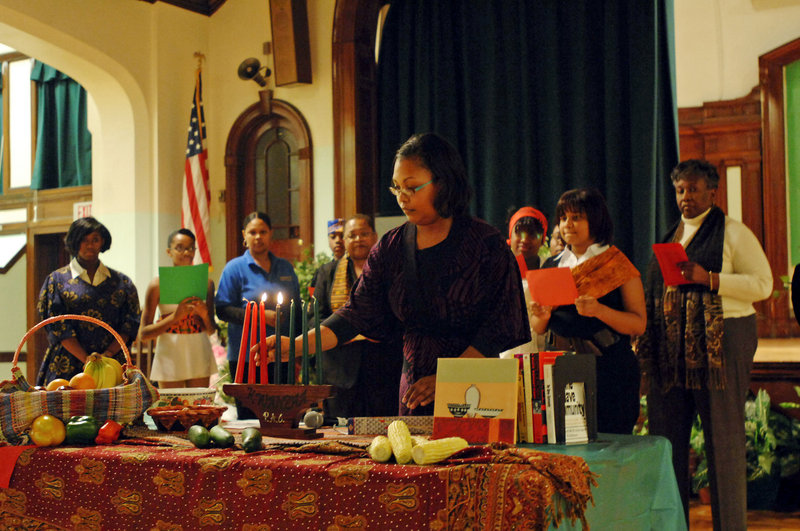HACKENSACK, N.J. – On Dec. 26, like every year for nearly two decades, Barbara Taylor-Rosser of Hackensack, N.J., lit the first of seven candles in observance of Kwanzaa.
The retired Paterson, N.J., teacher says she has taught the significance of the weeklong celebration of African-American culture to her children and former students, organized Kwanzaa events for community groups and even helped others begin the tradition in their homes.
“For me it’s so rich and exciting,” Taylor-Rosser said. “I always light my candles, and my candle holder stays up all year long, because we live by the principles of Kwanzaa all year long.”
Town libraries, schools and churches in many areas have already held various Kwanzaa events. The seven-day holiday is observed every year from Dec. 26 to Jan. 1 and celebrates family, community and culture. During these days, families who observe the holiday light candles, talk about the seven principles the red, green and black candles represent, and exchange handmade gifts.
“It’s something to look forward to,” said Lois Braithwaite, who used to organize the Kwanzaa event at the Johnson Public Library in Hackensack, N.J., and who is celebrating the holiday at her nephew’s house this year. “It’s not elaborate, it’s something simplistic but it’s meaningful and it gives children a sense of belonging, and sense of pride.”
Kwanzaa dates back to 1966, and was created by Maulana Ron Karenga, who is a professor and the chairman of the department of Africana studies at California State University, Long Beach. The holiday was created 45 years ago for African-Americans to honor and celebrate their heritage.
The word “Kwanzaa” comes from the Swahili matunda ya kwanza, which means “first fruits.”
Kwanzaa celebrates the Nguzo Saba, or the seven principles. The principles are umoja or unity, kujichagulia or self-determination, ujima or collective work and responsibility, ujamaa or cooperative economics, nia or purpose, kuumba or creativity and imani or faith.
As part of the candle-lighting ceremony, a kinara — a candle holder similar to a menorah — contains seven candles, three red ones, three green ones, and a black one in the center. During the seven days, a candle is lit to recognize each of the principles. Each day, a different principle is celebrated.
When first observed, Kwanzaa was part of the civil rights movement of the 1960s.
“At the time, it addressed and was part of the surge in black identity politics and culture,” wrote Clement Price, director of the Rutgers University Institute on Ethnicity, Culture and the Modern Experience, in an email last week. “It placed the complicated identity of American blacks within a sentimentalized view of African culture.”
He said that over time, Kwanzaa was popularized by the black-oriented media and ultimately became an “example of America’s mass culture ability to absorb and co-opt just about everything.”
Kwanzaa, he said, is now celebrated by a cross section of Americans, and not only blacks. Millions observe the holiday annually, according to Kwanzaa’s official website.
Beatrice Kisala, who came to the United States from the Democratic Republic of the Congo, said she doesn’t observe Kwanzaa, and that when her son came home from school one day and asked her about it, she explained to him why it wasn’t a holiday she wanted to follow.
“For me it’s a very complicated celebration that I don’t believe in. I just want him to know the principles of Jesus Christ and that’s all,” she said.
Over at the Community Baptist Church in Englewood, leaders of the church’s youth group will not celebrate Kwanzaa this year, but next, said Shantel Williams, director of the youth program.
Williams, who lives in Teaneck, N.J., will celebrate Kwanzaa with family this year. When her twins were in grade school, she said, she would host Kwanzaa, and light candles, talk about the principles, make crafts, and cook items from old family recipes. But when her children, who are now 24 years old, went to college, it became difficult to keep it going.
“They weren’t home as much, and it wasn’t anything I had control over, but I would still put out the table dressing, and the symbols in the house so that they knew it was Kwanzaa,” she said.
She said families with younger children still observe the holiday, and she hopes to one day host again.
“If I have some grandchildren one day, I still have everything I need for Kwanzaa so I’ll reinstitute it, or maybe my children will continue it with their families,” she said.
Send questions/comments to the editors.



Success. Please wait for the page to reload. If the page does not reload within 5 seconds, please refresh the page.
Enter your email and password to access comments.
Hi, to comment on stories you must . This profile is in addition to your subscription and website login.
Already have a commenting profile? .
Invalid username/password.
Please check your email to confirm and complete your registration.
Only subscribers are eligible to post comments. Please subscribe or login first for digital access. Here’s why.
Use the form below to reset your password. When you've submitted your account email, we will send an email with a reset code.